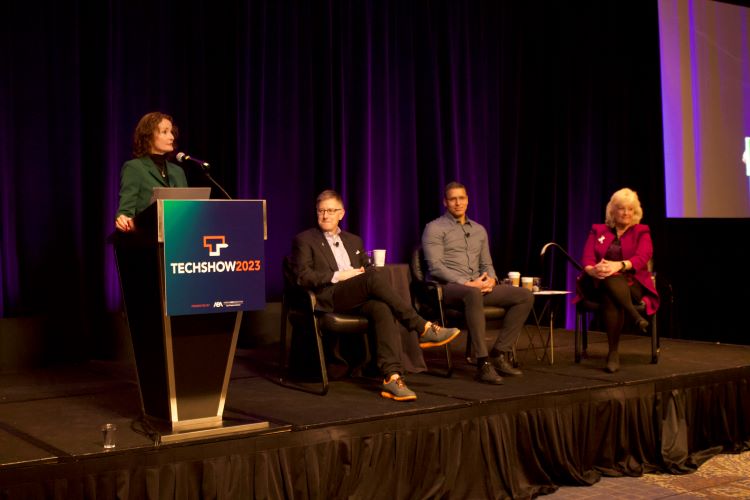Fictional ABA Techshow hearing tackles hot-button issue on amending rules of professional conduct

On Friday, a panel of experts, which included Jayne Reardon, Ed Walters, Darth Vaughn and Lynda Shely, answered questions during a fictional hearing at the second and final keynote at this year’s ABA Techshow. Photo by ABA Media Relations.
Should states relax rules of professional conduct to address the access-to-justice crisis and make legal services more affordable?
On Friday, a panel of experts took on that question during a fictional hearing at the second and final keynote at this year’s ABA Techshow at the Hyatt Regency Chicago.
Jayne Reardon, a 2021 ABA Journal Legal Rebel and former executive director of the Illinois Supreme Court Commission on Professionalism, moderated a panel of experts that included Lynda Shely, the chair of the ABA Standing Committee on Ethics and Professional Responsibility; Darth Vaughn, litigation counsel for the Ford Motor Co.; and Ed Walters, CEO of legal tech company Fastcase.
Techshow organizers have broken with tradition this year by dispensing with keynote addresses, replacing them with keynote panels to spur audience participation. In that spirit, the Friday morning event was billed as an “interactive session,” with participants taking part in a mock hearing in the state supreme court of the fictional state of “Centralia” to discuss modifying attorneys’ rules of professional conduct.
After Reardon banged a gavel, Shely, who practices in Arizona, noted that her state and Utah have already relaxed their rules to allow nonlawyer interests in law firms. Arizona entirely eliminated its version of Model Rule 5.4 of the ABA Model Rules of Professional Conduct, which bars lawyers or firms from sharing legal fees with nonlawyers, and has adopted an alternative-business-structure-only model permitting nonlawyers to take an ownership interest in firms without reforming its rules regarding the unauthorized practice of law.
“ABS law firms in Arizona are highly regulated [by the Arizona Supreme Court],” said Shely, adding that it isn’t a “Wild West.”
She said firms must disclose ownership interest over 9%, ensure that lawyers can give independent advice, and protect against other conflicts of interest.
Walters, meanwhile, said the legal industry faced a disruption similar to the impact of ride-sharing apps such as Uber and Lyft on the taxicab industry, and Netflix on brick-and-mortar stores such as Blockbuster. He said the industry had an opportunity to tap into what he estimated was a $1 trillion market for legal services.
“These are people who want to watch Top Gun: Maverick but who are forced to watch Terms of Endearment,” Walters said. “Our clients want to work with us, but we can’t get them legal services because we are stuck with our taxi medallions.”
He added that the “market is going to be disrupted,” and that the profession has an opportunity to be “Uber before there’s an Uber.”
The issue of nonlawyer ownership of firms is divisive. Advocates for changing rules that prevent nonlawyer ownership of firms say changes will help people access legal services and advice that are out of reach to many low-income and middle-class Americans. But some in the profession are vehemently opposed to relaxing the rules. They argue that allowing nonlawyer ownership of firms poses conflicts of interest, and that nonlawyers are not held to the same ethical standards as practicing attorneys.
Follow along with the ABA Journal’s coverage of the ABA Techshow 2023 here.
Audience members stood in as stakeholders during the panel and were asked to advocate their positions. One audience member who said he was a BigLaw practitioner asked the panel what it would do to stop Amazon, Costco and Walmart from offering consumer legal services and “decimating our colleagues” in the solo, small and general practice space.
Vaughn said there would still be room for lawyers to advocate and solve people’s problems, but that “as someone who purchases these services, I do not care where they come from.”
“I understand the concern that large forces can move into the space. But I would argue that those forces are already in the space. There are law firms that are humongous that are global corporations. And we don’t seem to have a problem with that now. I think they’ll be fine. They will adapt just like everyone else,” Vaughn said.
As part of her presentation, Shely said the Standing Committee on Ethics and Professional Responsibility had formed a work group that was considering Model Rule 5.5 and how lawyers might be able to move more easily over state lines to practice law.
“Why can’t I move to a different state and practice the law that I know, as long as I disclose to the client where I’m admitted, and I understand I’m going to be subject to that state’s jurisdiction and discipline?” Shely asked.
At the 2022 ABA Annual Meeting in August, the ABA adopted as amended Resolution 402, which reaffirmed that the sharing of fees with nonlawyers is “inconsistent with the core values of the legal profession.”
The resolution also recognized the importance to the profession and the public of the core values in Model Rule 5.4, which bars lawyers or firms from sharing legal fees with nonlawyers.
Techshow runs until March 4.



